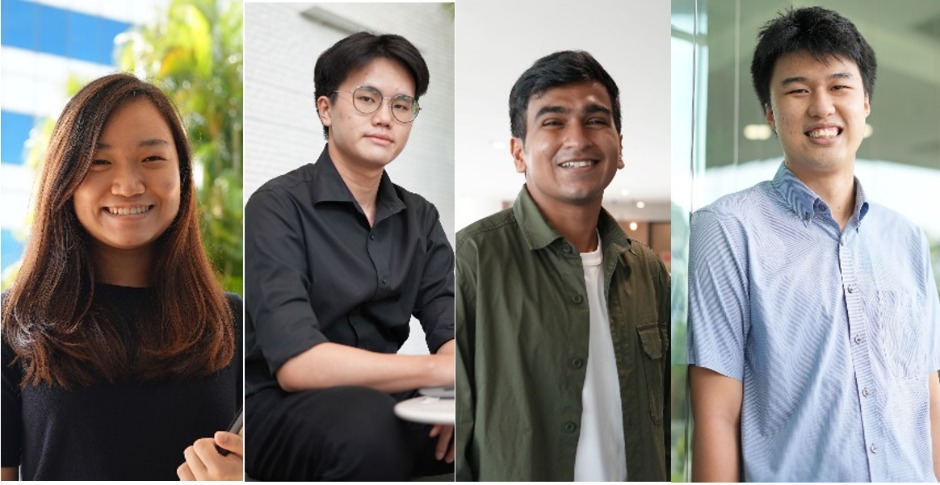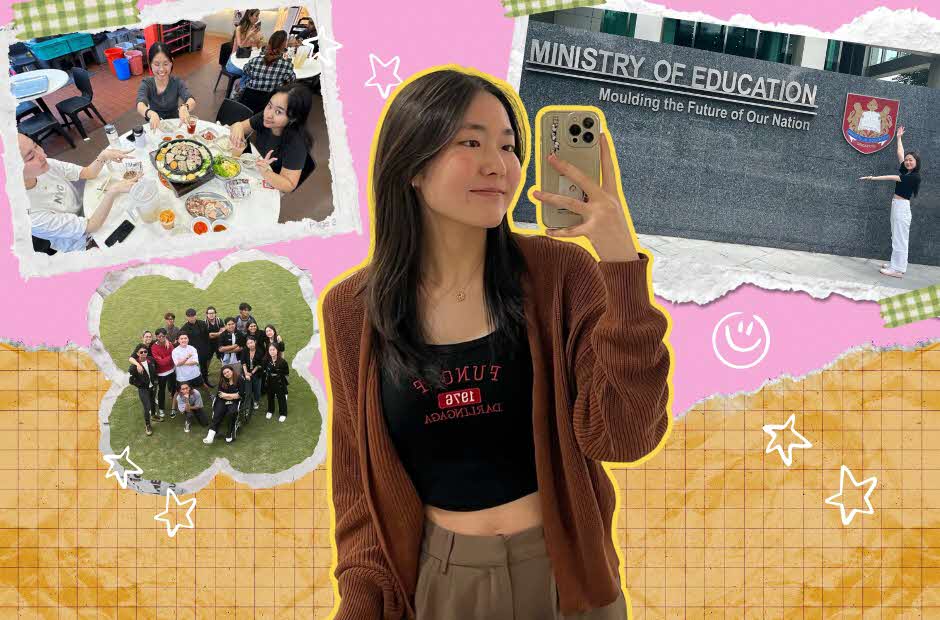When confronted with life’s crossroads, the bewildering number of options can make choosing a path forward rather daunting. What more when facing the worlds of cybersecurity, artificial intelligence, robotics or app development – central themes for the fourth edition of BrainHack, organised annually by the Defence Science and Technology Agency (DSTA).
We meet four students who are taking part, to find out how they discovered their love for all things tech.
Enjoy the process of making sense

Meet: Cammy Mun, 22
Loves: Mathematics and computing
Cammy has an affinity with numbers. “Since young, I enjoyed how math used logic to make sense of things. It gave me a sense of accomplishment when I managed to solve the problem,” she explains. As she grew older, Cammy took particular interest in two numbers: ones and zeroes – the binary code in computing.
Her CCA in River Valley High School sparked her interest in coding. In 2017, the school brought Cammy and her CCA mates in the Math Leaders Academy to the UK for a math and computing programme.
.jpg)
Cammy (back row, first from right) with her CCA mates at the Imperial College of London as part of the math and computing programme in the UK.
“I got to try computing for the first time,” says Cammy, “and after just one hour, I could code my own snake game, and even a conversational artificial intelligence (AI) bot, like Siri!”
She realised that she enjoyed creating digital tools to improve people’s lives, particularly in the area of processing data. “I’m fascinated by how through programming, you can make sense of all sorts of data sets to produce useful insights,” she explains. But with so many computing courses out there, how did she know what to pick?
She attended a dialogue on the relatively new Data Science and Artificial Intelligence course in Nanyang Technological University (NTU) where prospective students could chat with professors and seniors to find out more. “It was aligned with my interests, a happy balance between math and computing,” she says.
Fresh out of her first year of university, she participated in one of the activities under DSTA’s BrainHack organised in 2020. Titled “Today I Learned – AI Camp”, the virtual gathering taught participants to programme a computer that could identify clothing in an image. The technology is known as “computer vision”. She enjoyed it so much, she is joining this year’s edition too.
“I was amazed I could learn something so complex outside of school. I’m thankful for the mentors from DSTA too. We could easily ask them for useful materials and suggestions,” Cammy recounts. At BrainHack 2020, she also picked up more advanced coding skills, such as deep learning. Since then, she has taken up internships to explore various industry specialisations. She is now interning with DSTA on a Natural Language Processing project and hopes to continue in this field.
Be your own proof of concept

Meet: Cheong Ji Yiu, 19
Loves: Computational thinking and cybersecurity
“My family isn’t tech-savvy,” says Ji Yiu. “Since I was seven, they’d ask me to fix all our tech issues. So, I had to take things apart, research and figure it out on my own.”
Ji Yiu soon grew to enjoy figuring out how technology worked. “I liked tinkering and problem-solving,” says the Year 3 student in Singapore Polytechnic’s (SP) InfoComm Security Management course.
When he got an A1 in Computing for the O-Level examinations, he took that as affirmation for his strengths in this area. Being certain of what course and work he wanted to go into, he was set on going to polytechnic. But he wasn’t sure of the specialisation he wanted. So, he applied to the Common ICT (Information and Communications Technology) Programme at SP through the Early Admissions Exercise.
Thanks to BrainHack’s Cyber Defenders Discovery Camp in 2020, Ji Yiu says, he could develop a diverse range of knowledge in the field. In one challenge, students competed to see who can solve the greatest number of problems in 48 hours. He returned for the camp’s 2021 iteration and is joining this year’s too. With each successful experience, he proved to himself that he had the skills to pay the bills. Eventually, he decided to specialise in cybersecurity.
“Everyone deserves to use technology without fear and worry, and I want to contribute to that. Studying cybersecurity would mean I can help to keep our smart nation safe,” he says.
“Cybersecurity is like a battle involving two types of players: Adversaries who try to compromise the system, versus the people trying to defend it,” he continues. “But there’s also cryptography, which is about securing messages so only the intended recipients can read it.”
He approaches choosing a course of study in a similar way as he tackles computing problems: try various methods till you find one that works best. Taking time to do internships, research, or joining hackathons like BrainHack, all helped him explore different areas of computing.
Helping his parents understand his study choices took some time to prove that he knew what he was getting into. Ji Yiu’s parents were a little hesitant for him to go into a field they knew little about. He helped them warm up to the idea by sharing his positive outcomes with them, like any of his coding projects and achievements. “When I wanted to do something new, I’d try it first. If it turned out well, I make sure I show it to them.” These proofs of concept helped his parents gain confidence in his ideas.
Currently, Ji Yiu is interning with DSTA, and will graduate from polytechnic next year. This would serve as his proof of concept for pursuing a degree in Computer Science. In the meantime, he’s still the family tech guy, and also helps his 11-year-old sister set up her Zoom for school.
Take charge of your own learning

Meet: Yash Goyal, 21
Loves: Coding and app development
Yash often advises his juniors to “make room for aspiration, and not just go with the flow”. He says, “It’s easy to get swept up in the busyness of school, but then look back and not know what you’ve spent your time doing.”
He aims to walk the talk. At the end of his fourth year in the Integrated Programme at Victoria School, he joined his peers on month-long work attachments after their exams. During that time, he learnt how to make his own mobile application – tapping on open-source code he found on Google and asking for tips on Stack Overflow, an open forum for coders to ask and answer questions.
But he still wanted to explore his options. Having been raised by his grandparents, he saw them suffer from diabetes and other medical issues. “I wanted to go into medicine so I could help people like them,” he recounts. So, at the end of JC1, he looked for opportunities to experience the life of healthcare workers to see if he was cut out for it. A family friend pointed him in the direction of Admiralty Medical Centre, where he worked in a diabetes clinic, shadowing a nurse. What caught his eye however, were the glucose patches used and the programme that took in the data and made sense of it for the nurses. “That’s when I realised that my interest lies in tech, and how it can also help others in healthcare but at a larger scale,” Yash says.
In NS, he served as a Signals Officer, where he learnt about computer networks and communications. During rest times in the bunk, he decided to attend as many online courses on coding as he could, using e-credits that NS had offered, which was when he learnt how to code in Python.
“The more I explored, the more I enjoyed it. I liked how you get to see the results of your work immediately. You run a script, and it either works or it doesn’t, then you troubleshoot,” he says.
Now, Yash is certain about studying Computer Science in university. Having completed his NS in 2021, Yash began interning with DSTA in February 2022, and has been learning about computer vision, artificial intelligence, machine learning, and more. Together with his fellow DSTA interns, he is also participating in this year’s BrainHack.
“Hackathons are a good way to expose yourself to new skills in a stressful environment, which I believe is beneficial for learning,” he says, laughing because he knows some may not agree. “It also lets you meet and learn from people of all walks of life.”
Research, then take a leap of faith

Meet: Nicholas Neo, 25
Loves: Artificial Intelligence
Like his university mates, Nicholas, a Year 4 Computer Engineering student in NTU, took the typical subject combination of Physics, Chemistry, Economics, and Mathematics in Junior College. He chose a “STEM-related major” for his undergraduate studies because his parents believed it opened the most job opportunities.
During his first two years in university, he wasn’t sure what he wanted to specialise in. But the Circuit Breaker in 2020 offered him clarity. He joined BrainHack’s “Today I Learned – AI Camp”, where the mentors there advised him on career paths, as well as what skills are necessary to pursue a career in AI.
“They suggested that I set up my own coding projects to see what I really enjoy. So, I did,” he says. Nicholas also chanced upon an online course on deep learning. He went on to create his own “next word predictor”, where users can enter a phrase or incomplete sentence, and the algorithm would predict the next word that best completes it.
Everything led him to decide that he wanted to pursue a career related to AI, and even took a minor in Mathematics to integrate it with AI concepts. “It took a few leaps of faith to try things I’d never done before, but through them, I discovered my strengths and weaknesses,” says Nicholas.
.jpg)
Nicholas (centre) with his coursemates, holding one of their engineering projects for university.
In 2021, Nicholas joined BrainHack again. To round off his final year in university, Nicholas will be at this year’s BrainHack too.
He says, “The 2020 camp helped me put what I learnt into practice. My team didn’t win, but in the 2021 run, we made it into the finalist round!” And who knows, 2022 could be his year to win.






.jpg)